The Impregnating Resins Market is estimated to be valued at USD 1.9 billion in 2025 and is projected to reach USD 3.7 billion by 2035, registering a compound annual growth rate (CAGR) of 6.6% over the forecast period. The impregnating resins market is expected to witness steady expansion over the forecast period, driven by increasing adoption in electrical insulation, composites, and industrial applications. Early growth is supported by demand from transformer manufacturing, motors, and high-performance electrical equipment, where enhanced dielectric and thermal properties are critical. As industries focus on efficiency and longevity, uptake in advanced composites and high-strength laminates contributes to sustained momentum.
Integration of low-viscosity, high-penetration resins and eco-efficient formulations further strengthens market traction. Over time, the market has evolved from conventional applications to specialized industrial and high-tech sectors, including aerospace and automotive components. Year-on-year growth demonstrates a stable upward trend, reflecting both replacement cycles in mature industries and adoption in emerging regions.
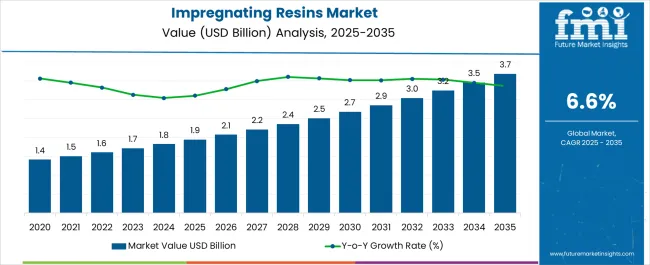
| Metric | Value |
|---|---|
| Impregnating Resins Market Estimated Value in (2025 E) | USD 1.9 billion |
| Impregnating Resins Market Forecast Value in (2035 F) | USD 3.7 billion |
| Forecast CAGR (2025 to 2035) | 6.6% |
The impregnating resins market is experiencing steady expansion due to increased demand for energy efficient electrical equipment and advancements in insulation technologies. The growing deployment of electric motors, generators, and transformers across industrial and automotive sectors has significantly raised the need for durable insulation materials capable of withstanding high thermal and mechanical stress.
Impregnating resins are increasingly adopted for their ability to enhance the dielectric strength, heat resistance, and operational reliability of electrical components. Innovations in low emission resin formulations and the shift toward environmentally friendly alternatives are further contributing to market growth.
The market outlook remains favorable as end use industries continue to prioritize extended equipment lifespans, reduced maintenance, and improved energy performance, particularly in response to global electrification trends.
The impregnating resins market is segmented by type, resin type, application, and geographic regions. By type, the impregnating resins market is divided into Solventless, solvent-based, and Others (waterborne). In terms of resin type, the impregnating resins market is classified into Polyester, Epoxy, Polyester Imide, and Others (Polyurethane, Silicone). Based on application, the impregnating resins market is segmented into Motors and Generators, Home Appliances, Transformers, Electrical and Electronic Components, Automotive, and Other (Aerospace, Industrial coating). Regionally, the impregnating resins industry is classified into North America, Latin America, Western Europe, Eastern Europe, Balkan & Baltic Countries, Russia & Belarus, Central Asia, East Asia, South Asia & Pacific, and the Middle East & Africa.
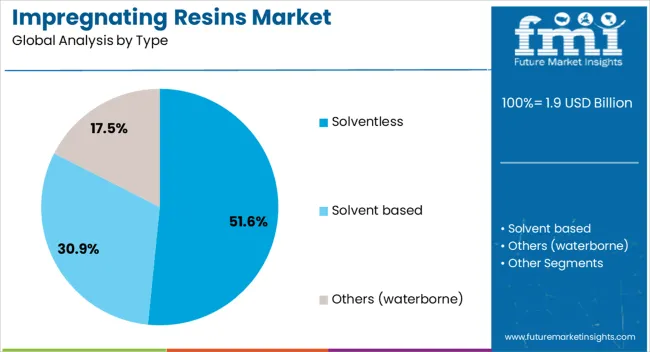
The solventless segment is projected to account for 51.60% of total market revenue by 2025 within the type category, establishing itself as the dominant formulation. This leadership is supported by growing environmental regulations limiting the use of volatile organic compounds and by the industry shift toward cleaner production methods.
Solventless impregnating resins offer higher solid content, reduced emissions, and improved workplace safety, making them increasingly attractive for high performance insulation applications. Their excellent penetration properties and compatibility with automated vacuum pressure impregnation systems have further supported adoption.
As manufacturers aim to meet sustainability goals without compromising performance, solventless formulations continue to lead the market due to their balance of environmental compliance and technical reliability.
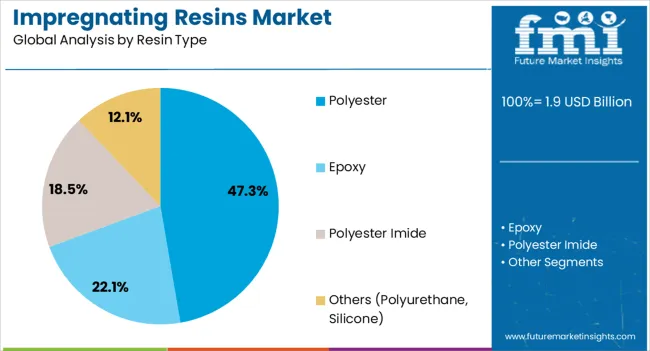
The polyester segment is expected to contribute 47.30% of total market revenue by 2025 in the resin type category, emerging as the most utilized resin system. This growth is being driven by the resin’s excellent electrical insulation properties, low curing time, and cost efficiency.
Polyester resins are widely favored in applications where moderate thermal endurance and strong mechanical performance are required. Their adaptability to a range of winding components and processing methods enhances their attractiveness in medium and low voltage equipment.
As cost-effective solutions remain a priority across manufacturing sectors, the polyester category continues to dominate resin selection due to its functional performance and affordability.
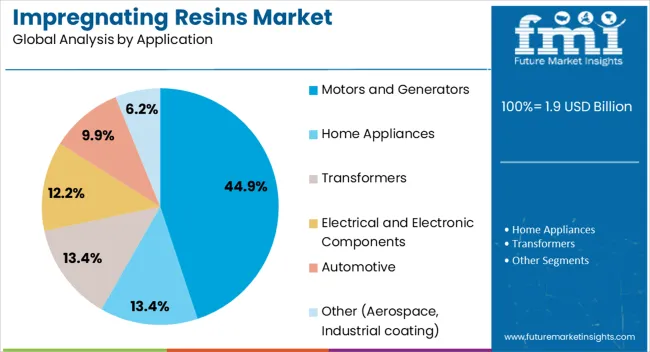
The motors and generators segment is projected to hold 44.90% of total market revenue by 2025 under the application category, positioning it as the leading end use area. This segment’s dominance is driven by the rising demand for high efficiency motor systems across automotive, industrial, and energy sectors.
Impregnating resins in motors and generators serves a critical role in enhancing thermal conductivity, reducing vibration, and improving insulation resistance. As industries push for longer equipment lifespans and reduced energy losses, the reliability provided by impregnating resins becomes essential.
The expansion of renewable energy infrastructure and electric mobility is further fueling demand in this segment, securing its top position in the application landscape.
The Impregnating Resins Market is driven by demand in electrical, automotive, and renewable sectors, while facing challenges from raw material costs and regulatory pressures. Opportunities in eco-friendly formulations are expected to fuel future growth.
The demand for impregnating resins is significantly driven by their use in electrical and electronic applications, where they are crucial for insulating and protecting components. They are essential in ensuring the performance and longevity of electrical systems in products like motors, transformers, and generators. As industries increasingly focus on efficient and durable electrical systems, impregnating resins play a vital role in providing enhanced resistance to moisture, heat, and chemical damage. This demand is further strengthened by the growing need for reliable, high-performance components across various applications, such as renewable energy, industrial machinery, and consumer electronics, where energy efficiency is a top priority.
The automotive industry is witnessing increased use of impregnating resins due to the growing demand for electric vehicles (EVs) and the need for improved electrical systems in these vehicles. Impregnating resins help ensure the reliability and durability of components like batteries, motor windings, and sensors, which are integral to EVs. Similarly, the renewable energy sector, particularly in wind turbine generators and solar power systems, is contributing to market growth as these industries require high-quality, long-lasting electrical components. This growth is driven by the push for more energy-efficient technologies and the rising adoption of clean energy solutions, which require robust insulation materials.
One of the key challenges facing the impregnating resins market is the rising cost of raw materials used in resin production. As demand for high-quality resins grows, manufacturers are encountering higher production costs, which can impact pricing and overall market accessibility. Additionally, regulatory challenges related to the use of certain chemicals in resins may slow down market growth. Compliance with environmental and safety regulations, particularly in regions with strict chemical use laws, is an ongoing concern. This can lead to increased operational costs and slow the development of new resin formulations, limiting market flexibility.
An emerging opportunity in the impregnating resins market lies in the development and adoption of eco-friendly resins. As industries across the globe seek to reduce their environmental impact, there is a growing demand for resins that are both efficient and environmentally friendly. These resins are formulated to meet performance standards while also adhering to stricter environmental regulations. The shift towards bio-based impregnating resins offers manufacturers a competitive edge, especially in industries like automotive, electronics, and renewable energy, where sustainability is becoming a priority. As eco-conscious demand increases, manufacturers are investing in developing resins that offer both high performance and lower environmental impact.
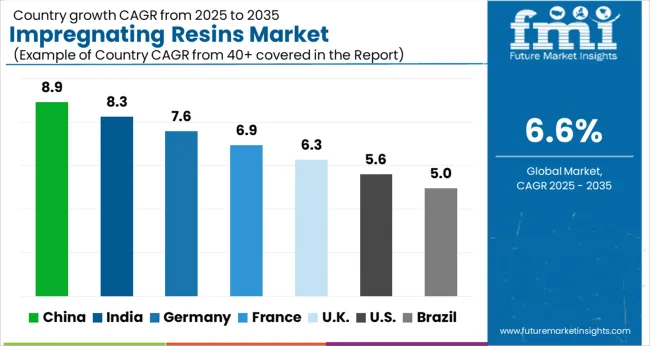
| Countries | CAGR |
|---|---|
| China | 8.9% |
| India | 8.3% |
| Germany | 7.6% |
| France | 6.9% |
| UK | 6.3% |
| USA | 5.6% |
| Brazil | 5.0% |
The impregnating resins market is projected to expand globally at a CAGR of 6.6% from 2025 to 2035, driven by the increasing demand for insulation in electrical components, particularly in automotive and renewable energy sectors. China leads with a CAGR of 8.9%, propelled by its rapid industrialization, increased demand for high-performance electrical systems, and the growing automotive and energy sectors. India follows closely at 8.3%, supported by rising investments in electrical infrastructure, increasing automotive production, and the transition toward electric vehicles (EVs). France records a 6.9% growth rate, driven by the adoption of advanced insulation materials in automotive and industrial applications. The UK sees a 6.3% growth, bolstered by its expanding electric vehicle market and the increasing need for efficient electrical systems in various industries. The USA reaches a 5.6% growth rate, reflecting steady adoption in the automotive and electronics sectors, particularly in high-performance applications. This analysis highlights Asia-Pacific as the leading growth region, with significant contributions from Europe and North America as mature markets driving the adoption of impregnating resins in various industries.
China is projected to post a CAGR of 8.9% for 2025–2035, up from an estimated 7.2% during 2020–2024, outpacing the global average of 6.6%. This upward shift is driven by China's rapid industrial growth, increased adoption of electric vehicles (EVs), and a strong push for advanced materials in renewable energy. The automotive sector, especially EV production, is contributing to higher demand for impregnating resins used in motor windings and batteries. Additionally, China’s renewable energy industry, particularly wind turbine manufacturers, relies heavily on impregnating resins to ensure durability and efficiency in electrical components. Domestic suppliers are expanding their production capabilities to meet the growing demand, while partnerships with international companies help improve resin quality and manufacturing processes.
India is forecasted to achieve a CAGR of 8.3% for 2025–2035, surpassing the global average of 6.6%. The rise is supported by the growing automotive sector, increased demand for durable electrical components, and expanding renewable energy projects. The adoption of electric vehicles and energy-efficient solutions is boosting the demand for impregnating resins, which are essential in electric motor windings and battery systems. Additionally, India’s shift toward wind and solar power is fueling the need for high-performance resins in power generation equipment. The growing industrial manufacturing sector is also a key driver, as more advanced and durable materials are needed to ensure the reliability of electrical components.
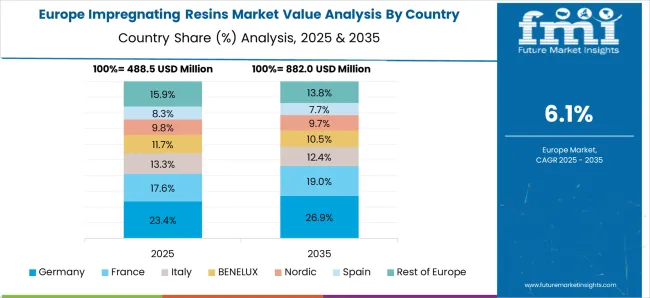
France is projected to grow at a CAGR of 6.9% for 2025–2035, up from 6.1% during 2020–2024. The market expansion is driven by the increasing use of impregnating resins in the automotive and renewable energy sectors. France’s commitment to advancing electric vehicle production and renewable energy infrastructure, especially in wind power, is fueling demand for impregnating resins in electric motor windings and turbines. The growing focus on sustainability and energy efficiency is leading to an increased need for high-performance resins. Additionally, the expansion of France’s industrial sector and the move toward more advanced materials are helping drive market growth.
The UK'is projected to achieve a CAGR of 6.3% for 2025–2035, up from 5.1% during 2020–2024. This rise is driven by the growing demand for impregnating resins in both the automotive and renewable energy sectors. The UK's shift toward electric vehicles is a major contributor to the increased use of impregnating resins in electric motor windings and batteries. The expanding renewable energy market, particularly in offshore wind turbines, is creating demand for these resins in power generation equipment. The UK’s focus on energy efficiency and sustainability also supports the need for high-performance materials, further accelerating market growth.
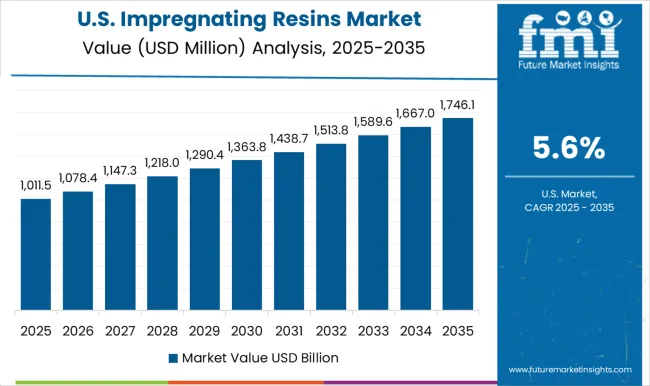
The USA is projected to grow at a CAGR of 5.6% for 2025–2035, slightly above the global 6.6% average. The demand for impregnating resins in the automotive sector, particularly for electric vehicles, is a significant driver of this growth. Additionally, the USA’s increasing investment in renewable energy infrastructure, including wind turbines and solar power, is supporting the need for high-quality insulating resins. The growing focus on energy efficiency in manufacturing processes, coupled with technological advances, is pushing the demand for advanced resins that offer superior insulation and durability.
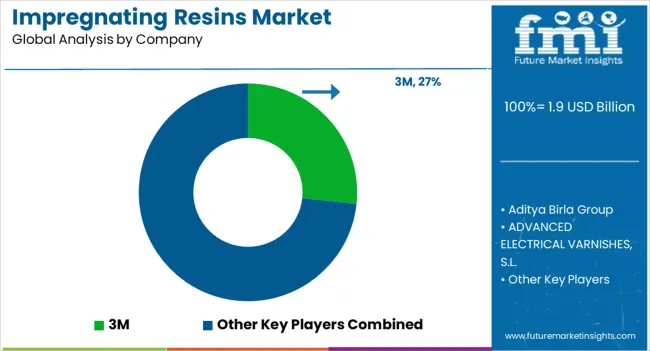
The market features key global chemical and material companies such as 3M, BASF SE, Henkel AG & Co. KGaA, and Huntsman International LLC. These players are known for their advanced resin formulations and market leadership in electrical insulation applications. 3M leverages its extensive expertise in electrical insulation materials, providing high-performance impregnating resins for use in the industrial and automotive sectors. BASF SE offers a diverse range of impregnating resins utilized in the automotive, electronics, and renewable energy sectors, with a focus on durability and high thermal resistance. Henkel AG focuses on developing resin solutions that offer superior insulating properties for electrical components in EVs, motors, and transformers. Huntsman International specializes in advanced polymers and resins for electrical insulation, offering products that cater to the automotive and industrial sectors, with a focus on high-quality, eco-friendly materials. Aditya Birla Group, Axalta Coating Systems Germany GmbH & Co. KG, and Bawa Polymers are also significant players, offering innovative resin solutions that are tailored to meet the specific requirements of automotive, industrial, and renewable energy applications. ELANTAS and Bodo Möller Chemie GmbH specialize in providing impregnating resins with excellent electrical properties, including high insulation and resistance to high temperatures, catering to both commercial and industrial markets.
The competitive landscape is shaped by innovation in material properties, especially regarding heat resistance, dielectric strength, and environmental sustainability. Strategic directions include the development of more efficient and eco-friendly resin formulations, partnerships between resin producers and component manufacturers, and expanding applications in electric vehicles and renewable energy systems.
| Item | Value |
|---|---|
| Quantitative Units | USD 1.9 Billion |
| Type | Solventless, Solvent based, and Others (waterborne) |
| Resin Type | Polyester, Epoxy, Polyester Imide, and Others (Polyurethane, Silicone) |
| Application | Motors and Generators, Home Appliances, Transformers, Electrical and Electronic Components, Automotive, and Other (Aerospace, Industrial coating) |
| Regions Covered | North America, Europe, Asia-Pacific, Latin America, Middle East & Africa |
| Country Covered | United States, Canada, Germany, France, United Kingdom, China, Japan, India, Brazil, South Africa |
| Key Companies Profiled | 3M, Aditya Birla Group, ADVANCED ELECTRICAL VARNISHES, S.L., Axalta Coating Systems Germany GmbH & Co. KG, Bawa Polymers, BASF SE, Bodo Möller Chemie GmbH, ELANTAS, Henkel AG & Co. KGaA, and Huntsman International LLC |
| Additional Attributes | Dollar sales for the period 2024–2035. They would focus on understanding the share of impregnating resins within the global resin market, identifying key growth drivers such as the rise of electric vehicle production, renewable energy adoption, and industrial automation. |
The global impregnating resins market is estimated to be valued at USD 1.9 billion in 2025.
The market size for the impregnating resins market is projected to reach USD 3.7 billion by 2035.
The impregnating resins market is expected to grow at a 6.6% CAGR between 2025 and 2035.
The key product types in impregnating resins market are solventless, solvent based and others (waterborne).
In terms of resin type, polyester segment to command 47.3% share in the impregnating resins market in 2025.






Full Research Suite comprises of:
Market outlook & trends analysis
Interviews & case studies
Strategic recommendations
Vendor profiles & capabilities analysis
5-year forecasts
8 regions and 60+ country-level data splits
Market segment data splits
12 months of continuous data updates
DELIVERED AS:
PDF EXCEL ONLINE
PE Resins Market Size and Share Forecast Outlook 2025 to 2035
Barrier Resins Market Size and Share Forecast Outlook 2025 to 2035
Coating Resins Market Size and Share Forecast Outlook 2025 to 2035
Plastic Resins Market Size, Share & Forecast 2025 to 2035
Phenolic Resins Market Size and Share Forecast Outlook 2025 to 2035
Iodinated Resins Market Analysis - Size, Share, and Forecast Outlook 2025 to 2035
Polyamide Resins Market Size and Share Forecast Outlook 2025 to 2035
Packaging Resins Market Size and Share Forecast Outlook 2025 to 2035
Protein A Resins Market Trends, Demand & Forecast 2025 to 2035
Key Companies & Market Share in the Protein A Resins Market
Wood Coating Resins Market Size and Share Forecast Outlook 2025 to 2035
Lignin Based Resins Market Size and Share Forecast Outlook 2025 to 2035
Ion Exchange Resins Market Size & Forecast 2025 to 2035
Polyurethane Resins Paints & Coatings Market Growth – Trends & Forecast 2025 to 2035
Polycarbonate Resins Market - Trends & Forecast 2025 to 2035
Cyanate Ester Resins Market
Orthophthalic Resins Market
Polybenzoxazine Resins Market Size and Share Forecast Outlook 2025 to 2035
High Purity PFA Resins Market Size and Share Forecast Outlook 2025 to 2035
India Protein A Resins Market Insights – Trends, Demand & Forecast 2025-2035

Thank you!
You will receive an email from our Business Development Manager. Please be sure to check your SPAM/JUNK folder too.
Chat With
MaRIA